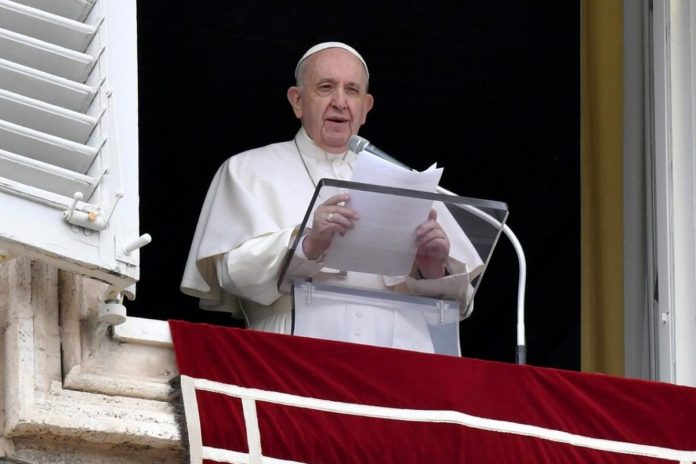Pope Francis on Sunday urged Catholics to read, reread, and be passionate about the Gospel.
In his Angelus address on Oct. 31, the pope said that familiarity with Sacred Scripture leads to intimacy with God.
“Dear brothers and sisters, the Lord is not so much looking for skilled Scripture commentators, but for docile hearts which, welcoming his Word, allow themselves to be changed inside,” he said.
“This is why it is so important to be familiar with the Gospel, to always have it at hand — even a pocket-size Gospel in our pockets, in our purses to read and reread, to be passionate about it.”
“When we do this, Jesus, the Word of the Father, enters into our hearts, he becomes intimate with us and we bear fruit in Him.”
The pope offered the advice while reflecting on the day’s Gospel reading, Mark 12:28b-34, in which a scribe asks Jesus: “Which is the first of all the commandments?”
Giving his live-streamed address at a window overlooking St. Peter’s Square, the pope noted that the scribe repeats Jesus’ reply to him.
“In giving his assent, why did that scribe feel the need to repeat Jesus’ same words? This repetition seems to be more surprising if we think that this is the Gospel of Mark, who has a very concise style. So, what could this repetition mean?” he asked.
“It is a teaching for us who are listening. For the Word of the Lord cannot be received as any other type of news: it must be repeated, made one’s own, safeguarded.”
The pope observed that the monastic tradition says that the Word of God must be “ruminated.”
“It must resound, echo, and re-echo within us,” he explained. “When there is this interior echo, it means that the Lord dwells in the heart. And he says to us, just as he did to that excellent scribe in the Gospel: ‘You are not far from the kingdom of God.’”
The pope said that this Sunday’s Gospel reading offered a good example of why it was necessary to meditate deeply on the Scriptures.
“It is not enough to read it and understand that we need to love God and our neighbor. It is necessary that this commandment, the ‘great commandment,’ resound in us, that we assimilate it, that it become the voice of our conscience,” he commented.
“This way, it does not remain a dead letter, in the drawer of the heart, because the Holy Spirit makes the seed of that Word germinate in us. And the Word of God works, it is alive and effective.”
“In this way, each one of us can become a living ‘translation,’ different and original. Not a repetition, but a living ‘translation,’ different and original, of the one Word of love that God gives us.”
“We see this in the lives of the saints, for example: no one is the same as the other, they are all different, but all with the same Word of God.”
The pope concluded his reflection by encouraging pilgrims to imitate the scribe.
He said: “Let us repeat Jesus’ words, making them resound in us: ‘To love God with all our heart, with all our soul, with all our mind and with all our strength and my neighbor as myself.’”
“And let us ask ourselves: does this commandment truly orient my life? Does this commandment resonate in my daily life?”
“It would be good this evening, before going to sleep, to make an examination of conscience on this Word, to see if we have loved the Lord today and if we have done a little good to those we happened to meet.”









